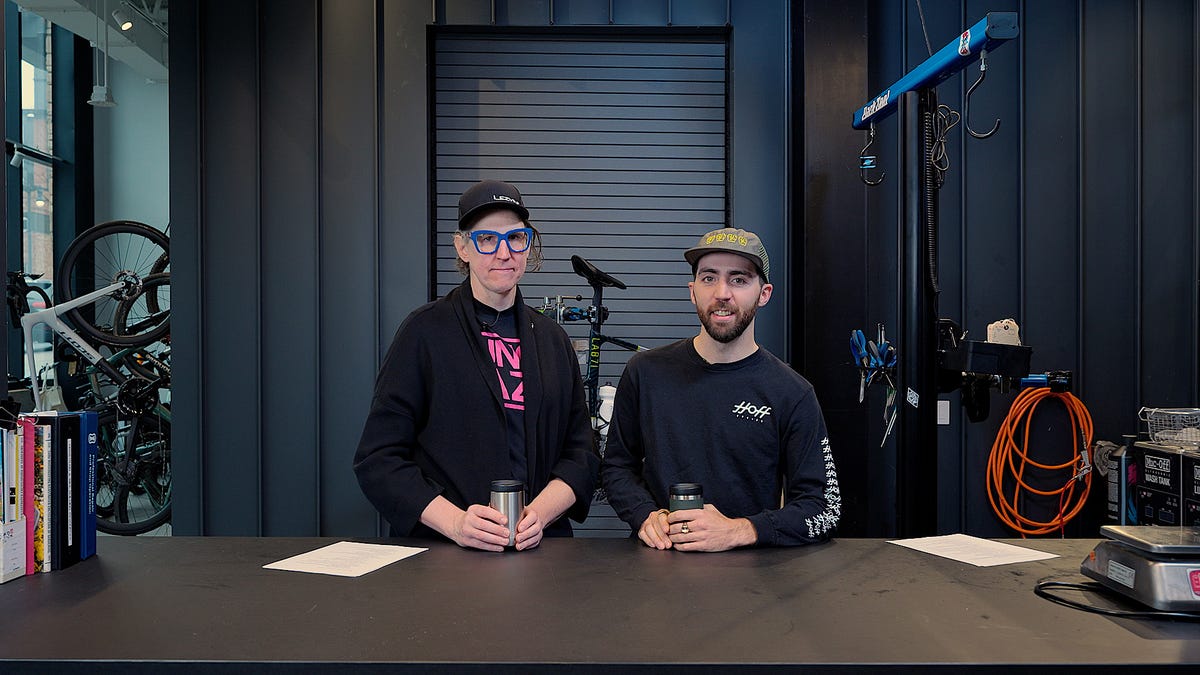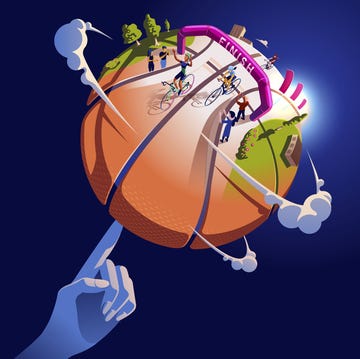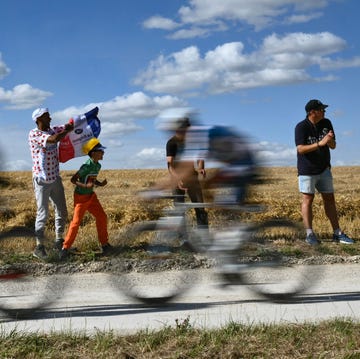By the time Tadej Pogačar finishes his new contract with UAE Team Emirates, he’ll be six years older and at least $50 million richer—unless his buyout clause is triggered, in which case he’ll be $200 million richer. The imagery is undeniable: at the 2024 Giro d’Italia, standing on the final podium draped in both the Slovenian and UAE flags, he became the living symbol of cycling’s expanding global reach and the complex alliances driving the sport forward.
It’s the most eye-popping contract cycling has ever seen and, in an era of increasing eyeballs and, therefore, increasing revenue, perhaps a harbinger of things to come for the sport’s biggest names. And rightly so. Pogačar is arguably the greatest cyclist we’ve ever seen. He’s also a proven winner whose palmarès include wins at the Tour de France, Giro d’Italia, World Championships, Il Lombardia, Liège-Bastogne-Liège, and Strade Bianche. And that’s just from this season. If anyone deserves to be paid handsomely, it’s Pogi.
“I am extremely proud to be extending my time here at UAE Team Emirates,” Pogačar said in the press release. “This team has been my home for the last five years, and I can’t imagine myself anywhere else. The best moments of my career have come here, and that’s a testament to the staff, management, teammates, and partners who allow me to perform at the highest level.”
In addition to securing their proverbial golden nugget, UAE Team Emirates is not shy about surrounding Pogačar with talent. A few short months ago, the team announced the splashy signing of Jhonathan Narváez, a talented 27-year-old rouleur who spent the previous six years riding for INEOS Grenadiers. The team also added Rune Herregodts from Intermarché-Wanty and Florian Vermeersch from Lotto Dstny.
Those moves will no doubt benefit UAE Team Emirates over the course of the season—to wit, Vermeersch is a talented one-day racer—but were mostly made to bolster Pogačar’s supporting cast as he goes for his fourth Tour de France win in five years.
However, one question that needs to be asked is what role this signing plays into the further development of sportswashing in cycling.
If you’re unfamiliar with the phenomenon, “sportswashing” is a term used to describe a type of propaganda that uses sports to improve reputations that have been tarnished by wrongdoing. In many cases, it’s a tactic employed by nations with poor human rights records and/or major political corruption scandals.
And while the term has only recently taken hold (in pro cycling), it can be argued that the practice goes back almost a century, when the 1934 World Cup was hosted by Benito Mussolini’s Italy or when both the Summer and Winter Olympics of 1936 were held in Nazi Germany.
More recently, FIFA was heavily criticized for awarding its 2019 World Cup to Qatar, a nation with a well-documented history of human rights abuses. On a similar front, soccer superstar Cristiano Ronaldo recently signed with Al Nassr Football Club of the Saudi Pro League for a reported €200 million annually.
The idea is that these nations, many of whom have abysmal rights records, are trading society’s unquenchable passion for sports to rehab their images in order to net more tourism and investment dollars.
According to Amnesty International, the United Arab Emirates (UAE) has “continued to unduly restrict the rights to freedom of expression and peaceful assembly. The UAE failed to meet its commitments on policies to combat climate change. Migrant outdoor workers still lacked adequate protection from extreme summer heat. Authorities continued to arbitrarily detain 26 prisoners of conscience, and denied or severely restricted some prisoners’ communication with their families.”
However, the UAE Team Emirates isn’t the only major cycling team for whom this could be an issue. They’re just the only one with enough budget to offer such an eye-watering contract as they did to Pogačar.
In fact, of the eighteen registered men’s WorldTour teams, only four are sponsored by nations. Those are UAE Team Emirates, Bahrain Victorious, Astana Qazaqstan, and Jayco AlUla (while Jayco is an Australian team, al-Ula is a region in Saudi Arabia). And one thing all of those countries have in common is that they’re all considered nations under authoritarian rule according to the UK-based Economist Group’s Democracy Index.
According to the Washington, DC-based non-profit organization Freedom House’s Freedom in the World ranking, which scores nations on a scale of 100, Kazakhstan has a score of 23, the UAE has a score of 17, Bahrain has a score of 12, and Saudi Arabia has a score of 8.
Of course, it’s a tricky line to walk because sports need investment, especially relatively smaller sports like cycling. Without money, we simply wouldn’t have a Tour de France, let alone an entire WorldTour. And it could also be argued that the involvement of UAE, Bahrain, Kazakhstan, and Saudi Arabia is broadening the appeal of this otherwise niche sport. It could be argued that nothing or no one is getting more people on bikes right now than Tadej Pogačar. And isn’t more people on bikes a win for us all?
It’s a question that doesn’t have an easy answer. But aren’t those often the ones most worth pondering?














